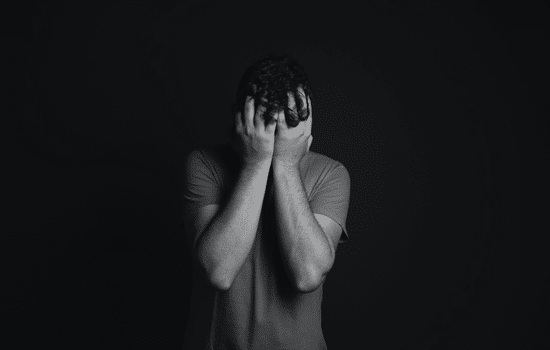Advertisements
Depression is a serious mental health condition that affects millions of people all over the world.
It is characterized by feelings of sadness, hopelessness and lack of interest or dedication in daily activities.
Advertisements
It can have a profound impact on an individual's quality of life, affecting their ability to work, maintain relationships, and participate in daily activities.
Don't let the depression bring you down!
Some people may suffer from depression as a result of a traumatic event or a major change in life.
Advertisements
Like losing a loved one, breaking up a relationship, or losing a job.
Others may have a genetic predisposition to depression, which may be triggered by stress or other life events.
Depression can manifest itself in different ways, and symptoms can vary from mild to severe.
Common symptoms of depression include persistent feelings of sadness and hopelessness, fatigue, loss of appetite, insomnia, and lack of motivation.
Some may also present physical symptoms, such as headaches, digestive problems, and pain.
See also:
Major depressive disorder
Overcome anxiety with simple strategies
Depression is a treated condition and there are many effective treatments available.
Antidepressant medication, therapy and self-care strategies can be effective in reducing symptoms of depression.
Cognitive-behavioral therapy, in particular, has been shown to be effective in helping people control their depression and change patterns of negative thinking.
It is important to seek help if you are experiencing symptoms of depression.
A mental health professional can help you understand the underlying causes of your depression and develop a treatment plan appropriate for you.
This may include therapy, medication, and lifestyle changes, such as exercise, healthy eating, and not enough.
It is also important to remember that depression is a common condition and that you are not safe.
Many people suffer from depression and are not ashamed to seek help.
With correct support and treatment, it is possible to overcome depression and live a full life.
In short, depression is a serious mental health condition that affects millions of people all over the world.
Understanding depression: what is it and how to lidar
It is characterized by feelings of sadness, hopelessness and lack of interest or enthusiasm in daily activities, potentially having a profound impact on the quality of life of the individual.
However, with depression in a treated condition, with adequate support and treatment, it is possible to overcome it and live a full life.
A depressing face has been part of the human experience for thousands of years.
Evidence of its existence can be found in written records and medical texts throughout history.
In ancient Greece, for example, the philosopher Hippocrates described a condition called “melancholy”, characterized by feelings of sadness, hopelessness and lack of motivation.
During the Middle Ages, depression was often seen as a spiritual condition, and people fighting against depression were frequently treated by the church or by exorcism.
This view of continued depression in Rebirth.
When depression was often seen as a spiritual or moral weakness, people fighting against depression were often avoided or ostracized.
In number 19, a change in attitude begins.
As we advance, doctors and scientists will help shed new light on the problem.
Doctors and researchers are beginning to see depression as a medical condition, rather than a spiritual or moral weakness, and the first treatments for depression are beginning to emerge, such as electroconvulsotherapy.
I do not know 20, the development of psychotherapy and the use of revolutionary antidepressant medications or the treatment of depression.
Now, depression is widely recognized as a serious mental health condition.
Effective treatments are available to help people control their symptoms and regain control of their lives.
Despite these advances, however, the stigma around depression still persists in many parts of the world.
Many people who struggle with depression still refuse to seek help, perhaps because they are ashamed of their condition or because they fear being seen as failing or crazy.
Do not let the depression turn on – assume or control now
Putting depression aside can be challenging, but it is possible to support certain strategies.
Here are some tips we can help:
Seek professional help:
The first step to control depression is to seek help from a mental health professional.
A therapist or doctor can help you understand the underlying causes of your depression and develop a treatment plan appropriate for you.
This may include therapy, medication and lifestyle changes.
Practice self-care:
Taking care of yourself is essential to control depression. This can include a healthy diet, enough sleep, and regular physical activities.
It is also important to practice activities that bring joy and help you relax, such as reading, gardening or taking a bath.
Challenge negative thoughts:
Depression can be characterized by patterns of negative thoughts that can be difficult to break.
It may be helpful to work with a therapist to identify and challenge these negative thoughts and replace them with more positive and realistic thoughts.
Connect with other people:
Isolation can cause depression, so it is important to connect with other people.
Spend some time with friends and family, join a support group, or volunteer in your community.
These activities can help you feel less sozinho and give you a sense of purpose.
Use mindfulness and relaxation techniques:
Mindfulness and relaxation techniques, such as meditation and deep breathing, can help you control stress and reduce symptoms of depression.
These techniques can help you focus on the present moment and calm your mind.

Keep it consistent with your treatment:
Consistency is essential when it comes to controlling depression.
It is important to follow your treatment plan and attend therapy sessions regularly.
This will help you constantly progress and stay on the right path.
It is important to remember that leaving depression aside is a process that can increase time and patience.
Be gentle and calm with yourself and know that there is no problem in asking for help.
By supporting certain strategies, it is possible to overcome depression and live a full life.
In conclusion:
A depressed part of human experience goes back thousands of years, and evidence of its existence can be found throughout history.
However, attitudes in relation to depression change over time and now depression is widely recognized as a serious mental health condition that deserves reconfirmation, treatment and support.




